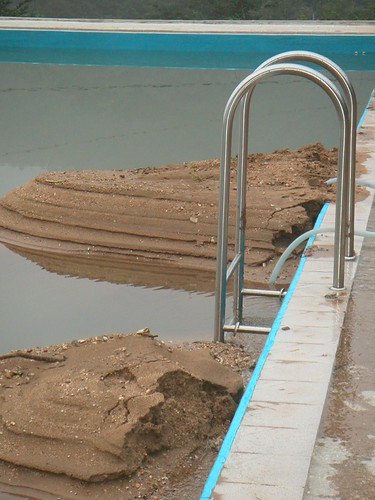A massive monsoon just hit Korea (see above) and due to this and the fact that the second session of camp was mysteriously curtailed to a roster of 25 children, I have the found the time to compose a few thoughts on my experience and research on teaching English in Asia. I think the best way to approach the issue is just to address a few of the questions that were boggling MY mind when I made the decision to come to Korea.
(And of course, a disclaimer is in order stating that the opinions, observations and information presented here are only that of my own and that each person¡¯s experience teaching English abroad is completely circumstantial and the following information should surely only be used as a guide!)
Q: Do I have the credentials to teach English?
A: Typically, to teach English in Asia you need:
1. A Bachelors or Associates degree (and diploma & transcripts to prove it)
2. English must be your first language (schools almost always requesting only American & Canadian applicants/accents)
3. A valid passport
4. Sometimes there are age limits and photo requirements
5. In almost all cases, consent to commit to a one-year contract is necessary.
Q: What is the level of teaching?
A: It completely depends on who your students are. Some people teach at university level, some teach businessmen, some do private tutoring and some teach at a grade school level. Often, first time teachers start out at the Kindergarten level, where less experience (and more energy) is necessary (and pay is lower). I, personally, taught 4th and 5th graders coming from more privileged educations. Their level of English was that of an American 1st grader. Our curriculum was mostly composed of basic conversation and themes (numbers, colors, animals, expressions) and very basic sentence structuring. The kids can learn the grammer from the own Korean teachers – it is YOU that is hired to really develop their oral, conversational, listening comprehension and pronunciation skills.
Q: What are the children like?
A; Now I don¡¯t really have any prior formal experience teaching kids (except that of the volunteer work I did in Guatemala, but that is an ENTIRELY different essay). But judging by the jaw-dropping I saw on the part of my fellow American-school-experienced teachers, I reckon that what I saw in my classroom should never be expected of any other classroom I may raise the chalk to. Our kids were obnoxiously courteous and respectful, abnormally eager to learn, and perfectly capable of sitting silently in small groups doing an activity without disturbance for two or more hours at a time. We had virtually no disciplinary problems. Please remember though, this is only my experience from a month camp, with Korean children, in the 12-13 year-old range. And any one of these facts could be a major contributing factor to the ease of the class.
Q: Do I have to create my own curriculum?
A: In almost all cases, NO. Any well-organized and accredited school will almost SURELY provide you with a complete and comprehensive curriculum with instructions on how and what to teach. Be sure to ask this question when interviewing. Raise an eyebrow to any school that assumes you will have this responsibility. BUT, understand that you WILL have to think creatively to adapt supplied curriculum to the needs of your students. And the ability to improvise on the spot and ¡°wing-it¡± are claimed by many experienced teachers to be ¡°essential¡± classroom teaching ¡°skills.¡±
Q: How much money can I make?
A: This depends primarily on what COUNTRY you choose to teach in. From my research it seems that Korea, Japan and Taiwan pay the highest salaries. Japan, however, is an outrageously expensive country, and a large portion of your income will inevitably be consumed by costs of living. Taiwan and Thailand have lower pay rates, but are more desirable destinations with less demand for teachers.
It would be relatively easy for me to find a fine teaching position here in Korea right now (had I not other adventures awaiting). The camp I am currently working at offered 2.5 million Won (over $2,000 US dollars) a month, including paying for all my expenses (food and lodging). That¡¯s a lot of money — especially for less than 20 teaching hours a week. But I¡¯d be living with only three other English teachers in a secluded camp that¡¯s quite far from the city and most of civilization. If I chose to take a position in Seoul however, even though I might have to pay for rent and food, I estimate that in one year I would be depositing no less than $15,000 US into my savings account (which in my book, equates to roughly two years of carefree world traveling). But it snows in Korea. A lot. For me, that¡¯s a tradeoff I¡¯m not really willing to make. As you can see, the number of factors involved in these personal decisions are infinite and must be in accordance to personal tastes.
Also, in regards to costs, almost all schools involve some kind of bonus/payment system based on a one-year contract. Many will refund you the cost of your airline ticket AFTER you have completed your one-year contract. Often times a ¡°completion bonus¡± will also be offered at the end of your term. The objective of this system is to provide incentives that reward fulfilling the year contract (and heavily discourage anyone from leaving early). I HIGHLY recommend asking for a reference (preferably an English teacher currently working there) from any school that you consider working for in order to confirm the validity of the contract and those that have proposed it.
Higher salary brackets apply to those who have completed higher education beyond a Bachelor¡¯s degree, those with ESL training/teaching certification, and those who have formal teaching experience in general.
Q: What’s Asia like?
A: What are the Americas like? This question is clearly too complicated to answer in a paragraph. Do your research. Read up on those countries that interest you online or in travel guides/books. Check out the message board postings on LonelyPlanet.com (the ¡°Thorn Tree¡±) or Dave¡¯s ESLcafe.com to read about personal experiences or get in contact with people who have actually been-and-done-that-English-teaching-thing in the country of your consideration.
Q: How much time do I work?
A: This varies by country and school. Expect to work anywhere between 15 – 40 hours. I¡¯m told by experienced ESL teachers to never accept a position that requires of you more than 20 teaching hours a week.
Q: Can I travel while I¡¯m there?
A: Most contracts seem to allow a minimum of 10 days of vacation. It is rumored that many of these MUST be taken during the Chinese New Year (in February). Some school offer many more weeks of vacation, but in general, I *personally* would NOT expect to be able to have much time to travel outside of the country (and that is what the savings account is for, eh?).
Q: Will I feel alienated or isolated living in such a foreign culture?
A: I can only speak of my immediate experiences in S. Korea. The Korean people are the most kind, courteous, hospitable, honest and genuinely caring people I have ever encountered in all my travels. Only here can you actually leave your backpack in the train station, walk 20 feet away into a store to buy a drink, and have complete and total confidence that it will still be there when you return. Only here, will a busy bus driver pull over to give you walking directions. Only here, will a bank teller walk you seven blocks to the terminal, buy your ticket, and make sure you get on the right bus. Only here will the taxi driver INSIST that you keep the change and reject any offer of tip. Only here, can you walk through dark, back alleyways and never ONCE glance over your shoulder or question your safety. Only here, will you be stopped in the street just to be welcomed into the country. No fear of violence. No fear of scandal. Just respect and peace. It sounds absurd, I know. I don¡¯t understand it. But perhaps more importantly is that now that I see it, I turn around — and it¡¯s the REST of the world that seems absurd. The Koreans are obsessed with taking care of guests to their country. And better hosts, I¡¯m sure, don¡¯t exist. But the language barrier is obviously extreme and Koreans seem *suspiciously but rightfully* hesitant about letting ALL their guards down to foreigners. So while you may be treated as nothing less than royalty, expect to put some serious time in if you are seeking an in-depth and ¡°real¡± understanding of the culture and people.
Q: Will there be other Westerners there?
A: Very likely. Not only will you probably quickly find and befriend other English teachers, but often times, if the school provides free accommodation, you will also be sharing an apartment with these same people. There are thousands of foreign English teachers throughout Asia. In major cities, it is not rare at all to step through double doors downtown and feel like you¡¯ve just been transported into a busy bar in California or New York (which can be either welcoming OR overwhelming).
Q: Would I be able to live an entire year there?
A: For you? I don¡¯t know. That is for you to decide. It depends of countless variables that I could never forecast. For me? Yes. From my experience here in Korea, I have determined that I could certainly teach English in Taiwan or Thailand for a year. It was a reassuring and happy decision to add this option to my ever-growing ¡°Opportunities Abroad¡± list.
Q: Where do I find a job?
A: There are an unlimited amount of teaching positions posted online. TeachAboad.com and Dave¡¯s ESLcafe.com are popular and powerful resources. You can also go through a placement agency (for a fee) if you¡¯re uncomfortable with making the arrangements yourself, prefer a little bit of hand-holding or want assurance of contract. If you¡¯re comfortable with your travel, bargaining and teaching skills, the best way to assure the highest salary and best contract is to just GO to the country and do all the research and interviewing yourself (skipping the middleman and his ¡°finder¡¯s fee¡±). The high season for recruiting is in the summer months and schools often times like to ¡°train¡± teachers in the summer so that they have some kind of experience before the school year technically begins.
Q: What happens if I hate it?
A: You can leave. You forfeit your right to all your future wages, bonuses and compensation for flight tickets – but you CAN leave. (Although, no one will tell you this.) But it really shouldn¡¯t be considered an option. The decision to sign a year contract should be thought out thoroughly. Make sure your motives are correct. If you don¡¯t like children or teaching or are just looking for a way to ¡°get out¡± or make a lot of money, this is not a good option. This is a serious commitment and responsibility – not just to yourself and your school, but also to your potential students.
Q: What’s the difference between working at a camp and at a school?
A: A GREAT way (as I have discovered) to figure out if teaching English in Asia is an option suited to you, is to work at an English immersion camp first. This is a short-term commitment that will usually pay for your flight tickets upfront (in exchange for less actual monetary compensation). During the session, you will quickly realize if you have the energy, skills and desire to make a more serious commitment to teaching English. Additionally, you will have the time and opportunity to make fantastic contacts in the business to assure yourself an ideal contract, working conditions and salary. The camp that I worked at is brand new and will be offering both summer and winter sessions for years to come. I will provide contact information for interested applicants for the Winter camp session once it becomes available.
Q: Do I really have what it takes to do this?
A: Do NOT reject this opportunity because you feel insecure about your knowledge of the English language, don¡¯t know how to write a curriculum or don¡¯t have any experience standing in front of a class with a piece of chalk.
It¡¯s more important to ask yourself these questions; Do you really enjoy kids? Do you have a lot of energy? Are you eager to learn? Are you eager to teach? Are you comfortable with taking on the responsibility and commitment? Are you open-minded? Can you assess a situation (or class) and think up creative ways of moving forward? Can you improvise when step-by-step instructions are not provided? Are you comfortable adapting to new environments? Are you a person of good disposition in general?
Make sure you analyze both your motives and personal goals of taking on such a responsibility. If you can find integrity and quality in your motives and can answer yes to the questions above, you will probably, as I have, find teaching English in Asia an extremely valuable and exciting opportunity to travel the world, learn about another culture, challenge yourself, meet new life-long friends and buff up your savings account all at the same time.
Hope that answers some of your questions!


